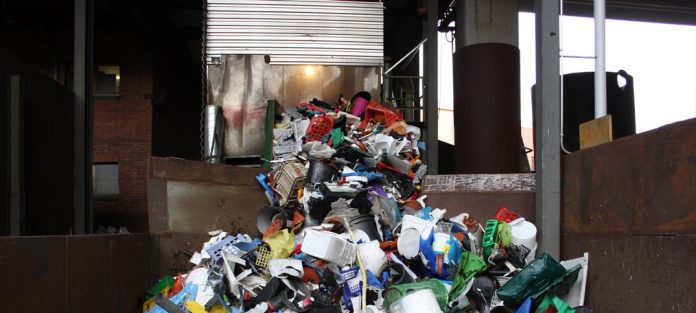In light of the ENVI Committee’s upcoming vote on the Plastics Strategy on July 10, FEAD, the EU private waste and resource management industry, welcomes MEP Mark Demesmaeker’s draft own-initiative report. However, FEAD would like to highlight crucial points that need to be touched upon in order for the Plastics Strategy to be fully effective.
Transforming the vision of a new plastics economy into reality will require joined efforts throughout the entire plastics value chain. Plastic products need to be designed for recycling; this will not only improve the economics, but also the quality of plastics recycling.
Up to Euro 10 billion worth of investments will be needed to innovate and expand the separate collection, sorting and recycling capacity at EU level. Our industry is prepared to make the necessary investments if there are legislative measures ensuring a significant uptake of plastic recyclates; which is becoming even more necessary by the minute in view of the Chinese ban on imports of certain waste streams.
A strong demand for recycled plastics will only result from concrete binding actions accompanied by economic measures to bridge the price gap detrimental to plastics from recyclates. FEAD members welcome the amendments calling for mandatory rules on recycled content which will stimulate the demand for secondary materials and therefore help drive the necessary investment in collection, sorting and recycling. From this perspective, the association supports the idea of a reduced VAT for products with recycled content, which will allow recycled plastics to compete with virgin polymers.
Quality standards, as an additional tool to further build trust and demand for the use of recycled plastics, should only be introduced in parallel with binding recycled content measures. This would ensure that investments for achieving higher quality standards will be economically justified. Ultimately, accelerating work on the interface between chemicals, waste and product policies is necessary to build confidence in recycled plastics in view of manufacturers’ needs for reliable quality and supply. Moreover, design for recycling and better-quality information on the presence of substances of concern will optimise the work of waste operators and ensure safe recycling.
Views on the Amendments on MEP Demesmaeker’s Draft Report
FEAD’s members welcome the publication of the draft own-initiative report on a European strategy for plastics in a circular economy by rapporteur MEP Mark Demesmaeker as a step forward for designing a new vision for plastics as part of the transition to a circular economy. In view of the Committee vote planned for 10 July 2018, FEAD would like to draw the attention of the MEPs to crucial points for the private waste and resource management industry.
Key points:
“Creating a genuine single market for recycled plastics”: mandatory recycled content, reduced VAT, and quality standards
A strong demand for recycled plastics will only result from concrete binding actions accompanied by economic measures to bridge the price gap detrimental to plastics from recyclates. FEAD’s members welcome the amendments calling for mandatory rules on recycled content which will stimulate the demand for secondary materials and therefore help drive the necessary investment in collection, sorting and recycling. From this perspective, FEAD supports the idea of a reduced VAT for products with recycled content, which will allow recycled plastics to compete with virgin polymers.
Quality standards, as an additional tool to further build trust and demand for the use of recycled plastics, should only be introduced in parallel with binding recycled content measures. This would ensure that investments for achieving higher quality standards will be economically justified.
Other points:
Biodegradable, oxo-degradable and bio-based plastics
FEAD supports the use of bio-based plastics as long as they are not promoted at the expense of recycled plastics. It is however important to make a clear distinction, on the one hand, between bio-based and biodegradable plastics and on the other hand, between biodegradability and compostability. Today, some bio-based plastics do not biodegrade in bio-waste treatment plants and none degrade completely in the natural environment (including waterways). Compostable plastics do not degrade in anaerobic conditions (AD) unless followed by an aerobic process and given the difficulty to distinguish between compostable plastics and conventional plastics, even if they are correctly disposed of by the householders, they are likely to be sorted out at the composting plant and sent for recovery.
Biodegradable plastics are also problematic when they are mixed with recyclable plastics as they do not have the same material properties and may impact the integrity of the recyclates. The use of biodegradable plastics must be specific enough that the correct recycling route is clearly identifiable for the consumer/user. The mere risk that this might happen has already been known to discourage manufacturers to use recycled content. Moreover, some amendments reflect a very unrealistic expectation regarding the transition from fossil-based plastics to sustainable bio-based plastics. Bio-based plastics must be fully compatible with fossil-based plastics in order to ensure a correct recycling of both types. The development of a bio-based logo is in such context not desirable.
Waste-chemicals interface
FEAD members consider that “reinventing plastics” should start at the eco-design phase by phasing out substances of concern which are complex and costly to recycle. As long as hazardous substances can be placed on the market legally by manufacturers, recycling companies will have to deal with them at some point. The challenge is therefore to determine how to deal with “legacy substances” in order to achieve toxic/risk free material cycles which may exclude recycling if hazardous substances cannot be safely recycled. Full information and traceability should be ensured for chemicals in plastics, with all the actors along the different stages of the waste management and recycling chain.
The Complementary role of waste to energy and landfill for non-recyclable plastics
Waste types which are either recycling residues, or are unrecyclable for technical, environmental or economic reasons have to be tackled in a realistic way, with the view that waste-to-energy can be a valuable solution for these waste streams. Landfilling should also remain an available option for some non-recyclable waste flows which are not suitable for waste-to-energy. An absolute landfill ban is legally and technically impossible.
Separate collection and sorting
Putting in place systems to collect waste separated at the earliest stage can be an effective way to increase the quality of secondary raw materials and increase recycling rates. Our industry is ready to invest in sorting and collection infrastructures, provided that there will be enough visibility on the uptake of recyclates at a later stage.
Recycling-friendly design – Ecodesign
At the present moment, manufacturers do not take into account the requirements for reprocessing and recycling when designing their products. The design of products as well as the selection and combination of the materials used have a significant influence on the processes and the success of the recycling. The recyclability of plastics and thus the preservation of materials in the circular economy should be the first priority in product design. The criterion for placing a product on the market must therefore be optimal recyclability at the end of its useful life.
Therefore, there is a need for greater cooperation between manufacturers and waste and resource companies in order to optimize their recyclability. In addition to fulfilling important functions (for example, the protection of the filling material through packaging or the insulating effect of insulating materials), the possibilities and limits of the processing and recycling processes must already be taken into account in the design and development of the products.
Source: FEAD







